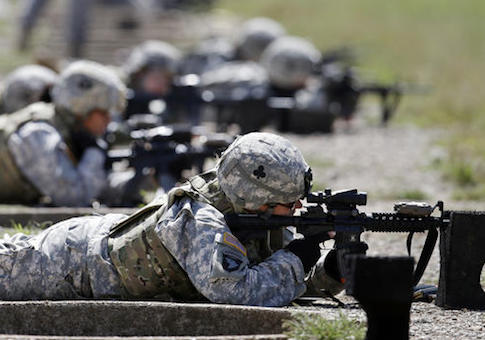The American Civil Liberties Union is asking the Supreme Court to declare the Military Selective Service Act unconstitutional, opening the door for Congress to include women in the draft or abolish selective service outright.
The ACLU claims that a men-only draft amounts to unlawful sex discrimination. The MSSA requires all men between the ages of 18 and 25 to register with the Selective Service System in case a national conscription is reinstated.
The Biden Justice Department will now decide whether to defend the sex-based draft before the High Court. The Justice Department almost always defends federal laws in court, unless no reasonable argument can be made in their favor.
The Trump administration defended the statute in lower courts. It’s unclear if the Biden administration will do so. President Joe Biden recently applauded the idea of a more gender-inclusive military, noting that the army now produces flight suits for pregnant women.
The MSSA is one of the last provisions of federal law that discriminates based on sex. The Supreme Court upheld the sex-selective draft in the 1980 case Rostker v. Goldberg. That ruling turned on the fact that women were excluded from combat roles at that time. A six-justice majority therefore said the MSSA’s registration rules reflected military policy, not a congressional choice to discriminate between like groups.
The Pentagon announced in 2015 that it would fully integrate women into combat roles and special operations units without exception. The ACLU says the military’s integration policy eliminated any basis for a sex-based draft.
The Fifth U.S. Circuit Court of Appeals acknowledged that key change but nonetheless ruled against the ACLU in August 2020, saying Rostker remains binding precedent.
Now before the High Court, the plaintiffs are asking the justices to take up their case and overturn the 1980 decision.
"The factual and legal bases of the Court’s ruling in Rostker have been upended; its central predicate has been eliminated with the combat ban’s rescission. The decision was poorly reasoned then and is a stark outlier now," the ACLU’s petition reads.
A 2017 Pentagon report endorsed female draft registration, citing the military’s diverse personnel needs. Apart from front-line operators, the armed forces also rely on engineers, intelligence analysts, and cyber operators.
"It would appear imprudent to exclude approximately 50 percent of the population—the female half—from availability for the draft in the case of a national emergency," the report reads. "Future wars may have requirements for skills in non-combat fields in which the percentage of individuals qualified would not be as variable by gender."
The report concedes that drafting women for combat roles could degrade public support for a large-scale conflict requiring conscription.
The plaintiffs in the case are the National Coalition for Men and two draft-eligible males. Many historic sex discrimination cases were litigated by male plaintiffs, because sex-specific laws can impose special burdens on men. In this case, men who fail to register face stiff penalties, including fines or jail time, and they can lose eligibility for federal student loans and civil service jobs.
A group of retired military leaders, including Gens. Michael Hayden and Stanley McChrystal, filed an amicus brief urging the justices to hear the case and overturn Rostker. The brief argues that female registration is essential to maintaining an adequate draft pool. With an aging population and falling birth rates, the pool of eligible men is "roughly half of that available during Vietnam," the brief reads. And approximately 70 percent of draftees are thought to be ineligible because of moral, educational, and health standards.
"Requiring all young Americans to register, regardless of sex, will prevent the selective service from falling into irrelevancy, unable to meet the nation’s national security needs in a time of peril," the brief reads.
It’s not clear how Congress would respond if the Court struck down the sex-selective draft. A new statute could abolish registration altogether, or require everyone ages 18-25 to sign up.
The Department of Justice’s response to the petition is due by April 14. The justices could decide whether to hear the case as soon as June. The case is No. 20-928 National Coalition for Men v. Selective Service System.
